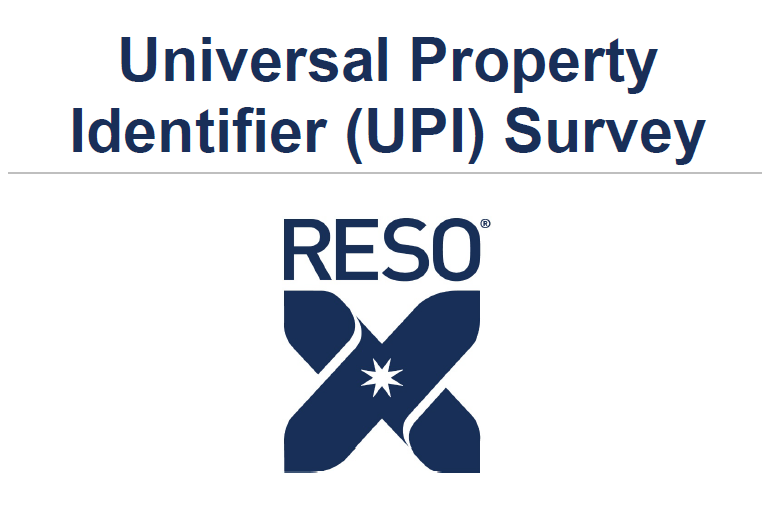The Universal Property Identifier (UPI) Workgroup recently embarked on a member survey to help them navigate where to go next with UPI and UPI Registry expansion.
As a refresher, the UPI is a standard way to reference a property. The specification developed by RESO includes support for identifying properties internationally in a hierarchical manner starting with the country. Using the UPI, a property can be referenced in an unambiguous way, which is valuable for many use cases, including deduplication and globally unique references in different systems. The UPI works essentially by specifying a property’s “serial number” as a legally defined entity.
The next step for the UPI is developing a UPI Registry, an event-logging database that collects evidence of facts related to UPIs. For example, a company that sources data about property taxes or permits could produce a reference on the registry each time it registers a new fact about a UPI. This data producer wouldn’t put its full data in the registry, just a reference that it has facts about that UPI. As the number of data producers creating references to UPI facts grows, the confidence scores in the UPI Registry grow.
Looking at the makeup of survey respondents and their awareness of the UPI:
- A majority of respondents (61.9%) came from the MLS world, but there was a good cross-section of real estate industry representatives from technology vendors and brokers/agents.
- Most respondents understood data integration to the extent that they worked with or were themselves a vendor (90.8%) and were seeking some form of RESO certification (80.4%).
- When a RESO UPI certification becomes available, 20.0% said they would seek it for their organization.
- To a great extent, members knew what the UPI was (77.5%) and believed that it had value (68.8%) to the real estate industry.
Of interest was the fact that 74.8% of UPI-aware respondents had three or fewer years of awareness, meaning that this is still a fairly new concept to many despite its being part of the RESO collection of services for much longer than three years. It showed that more effort is needed in drawing attention to it and presenting meaningful use cases as well as additional communications and development around the product.
UPI usage is still in a fledgling state, but there is room for growth based on the following responses:
- At 8.1%, few people are using the UPI today, which is why the UPI Workgroup has recently sprouted a UPI Registry Subgroup to provide further time and resources toward that effort.
- There is clearly interest in the UPI from a larger faction, as 33.3% said they plan to use the UPI in the future.
- In fact, few people said they wouldn’t use the UPI in the future, opting instead to state that they were unsure. Combining “Yes” and “Unsure” answers creates an opportunistic 94.8% potential pool of users among survey respondents.
- Nearly half of all respondents (48.4%) said they would use the UPI once the UPI Registry was available, further emphasizing the need to work on that aspect.
- Other potential uses for UPI provided some of the more enlightening answers. Top responses included insurance, mortgage, tax, first responders/fire/911, governments (local/county/state/national), mapping/geocoding/GIS, appraisal, delivery service, title, lending, property assessment and public records.
Responses to whether or not distributed ledgers (blockchain) should be used with the UPI Registry, answers were mixed but not discouraging.
There is still mostly a lack of familiarity with the technology, at least in this respect, so the group will continue to explore the possibilities.
Three of the more quotable general feedback answers that were received include the following:
- “It’ll add efficiencies to every aspect of a transaction where the property address is currently used.”
- “UPI could be a game changer in my business – not sure of all the uses, but I know what we have now is basically useless.”
- On distributed ledger / blockchain of transactions: “Although this would be ‘big data,’ it would truly make history. UPI just needs to be ready to ‘split’ properties and ‘join’ properties without causing confusion in historical records.”
Overall, it was an engaged set of respondents that have given us plenty to think about and act upon as we work toward future growth and implementation of this slyly simple but powerful tool.


